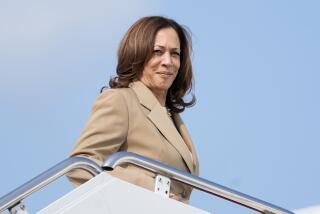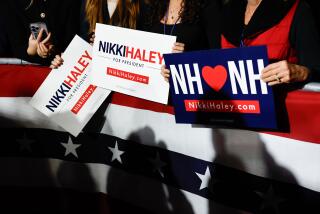New Hampshire Spotlights Clark’s Woes
- Share via
CONCORD, N.H. — CONCORD, N. H. -- Deep into the presidential primary season here, the foliage has started to lose its autumn uniform of brown, orange and gold. The big wet flakes of the first snow have fallen. And once again, the Boston Red Sox have broken the hearts of New England baseball fans.
Perhaps the only thing not conforming to the natural rhythms of the New Hampshire fall is the five-week-old campaign of retired Gen. Wesley K. Clark. At a time when other high-profile candidates are shifting into overdrive, the Democratic candidate is having trouble getting his campaign out of first gear.
Clark’s New Hampshire experience highlights the difficulty he may have translating his national popularity -- he tops many national polls of Democrats -- into primary wins.
“Clark is trying to do in essentially five weeks what other, more experienced candidates have been doing for 11 months,” said Jennifer Duffy, an analyst with the Cook Political Report, which offers nonpartisan analysis.
He will open his first field office in the state today (rival Howard Dean, former governor of Vermont, opened his first on March 1 and now has 12 offices). Clark’s public appearances still are mostly scheduled on the fly, and he has been sidelined for days at a time with laryngitis. A local political Web site, www.politicsNH.com, lists him as securing just three out of 105 key endorsements in the state (Sen. John F. Kerry of Massachusetts has 24).
A poll of likely voters in the state’s Jan. 27 Democratic primary released Friday by the national pollster, John Zogby, showed Clark tied for third with North Carolina Sen. John Edwards at 6%. Dean topped the field at 40%, followed by Kerry at 17%. In other recent polls on New Hampshire, Clark was near 10%.
Political observers here wondered what it would take to ignite the Clark campaign. They say his performance is especially vexing considering his national popularity, his background as a four-star general and war hero, and the charisma he has shown while campaigning in New Hampshire.
“It’s amazing to me to see this kind of squandering of an opportunity,” said Michael Dennehy, who ran Arizona Republican Sen. John McCain’s winning New Hampshire effort in 2000. “It’s very strange, but it only means it’s chaotic inside the campaign.”
Clark aides concede to initial disorganization when the campaign began mid-September, saying it was inevitable as the political movement rapidly evolved from a grass-roots “Draft Clark” Internet stage to a more refined campaign run by professionals. But they say they have staff and strategy in place to catch up.
“The early days were tough, since this campaign had to go from a standing start to 100 mph in about three seconds,” said John Hlinko, director of Internet strategy for Clark. Hlinko founded www.draftwesleyclark.com, a Web site that generated 50,000 letters in support of Clark’s candidacy and $2 million in pledges.
Clark, like several of the other Democratic presidential contenders, faces an additional handicap in New Hampshire -- he is up against two opponents from neighboring states: Dean and Kerry. “The favorite sons sucked all the political oxygen in the state,” said Dean Spiliotes, a presidential scholar at the New Hampshire Institute of Politics at St. Anselm College. “There are not enough Democratic political elites to go around.”
Clark’s bumpy road began on the first night of his campaign, Sept. 16. Staffers scheduled him to go to South Carolina the next morning on a prop plane to address the cadets at the Citadel. The flight was scheduled despite the advance of Hurricane Isabel, which the National Weather Service predicted would hit the North Carolina coast.
At the last minute, the Clark campaign scrapped the South Carolina stop, leaving his schedule empty on the second day of his candidacy.
Clark’s first public events in New Hampshire weren’t much better. Aides could be overheard bickering and the candidate’s military friends tried to give orders to the media, said James Pindell, managing editor of www.politicsNH.com.
“It was wild,” Pindell said. “But it has gotten so much better.”
Pindell said the improvement began this month after Florida Sen. Bob Graham quit the race and the Clark campaign picked up many of his veteran staffers.
As the campaign shows signs of better organization -- a major policy speech on the economy before an audience of 200 went off without a hitch Wednesday -- observers don’t rule out the possibility of a strong Clark finish in New Hampshire.
This is especially true since he decided last week to forgo the Iowa caucuses on Jan. 19 to focus on New Hampshire. It was a strategy successfully employed by McCain in 2000.
But time, already short, is running out. And a stubborn case of laryngitis has stolen from his finite number of days to campaign. He had to cancel an event Thursday at the New Hampshire State Library.
Sitting in the empty room where Clark was to have spoken, state librarian Michael York said aides promised the candidate would be back before the primary. York, with a bit of pride and a small smile, said that would be wise since the short flight of stairs leading to his building was “the steps to the White House.”
“You are not a serious candidate until you pay homage” here, York says.
Aides say Clark’s strategy is to spend a third of the next 90 days in New Hampshire. Much of the rest of the time, he’ll campaign in other early primary states -- such as South Carolina -- and raise funds.
Clark has raised money quickly. As of mid-October, he reported having $3.5 million. But he still lags far behind Dean, who has raised $25 million this year.
Katie Wheeler, a former Democratic state senator, said Clark would do well in New Hampshire if he could spend enough time in the state to let voters get to know him.
“For a lot of people who have gotten behind Gen. Clark, it’s like the light bulb clicked,” said Wheeler, who has endorsed him. “Here is someone who can defeat Bush and become president. A lot of people have been waiting for someone like this.”
In this state, voters expect to see candidates in person. And candidates work hard at trying to reach as many of the state’s 160,000 voters as possible. For instance in August, Edwards embarked on a six-day, 26-town bus tour of New Hampshire.
“We haven’t seen what kind of campaigner Wes Clark is,” Spiliotes said. “The feeling up in New Hampshire has been wait and see.”
An old New Hampshire joke, now being told about Clark, has one resident asking another if she’s going to vote for the general. “I don’t know,” she replies. “I haven’t met him yet.”
The Clark campaign this week tried to lower expectations in New Hampshire, contending that a fourth-place finish would be a victory considering the obstacles. Most political experts, though, believe he needs a strong third-place finish to continue a viable campaign.
“To try and spin to New Hampshire voters that fourth place is presidential material is ridiculous,” Dennehy said. “There’s no evidence of this ever being done.”
*
Times staff writer Johanna Neuman contributed to this report.
More to Read
Get the L.A. Times Politics newsletter
Deeply reported insights into legislation, politics and policy from Sacramento, Washington and beyond. In your inbox twice per week.
You may occasionally receive promotional content from the Los Angeles Times.










